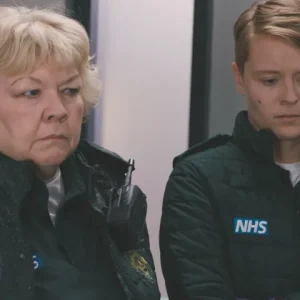In a hospital full of noise, chaos, and flashing lights, Dr Rash Masum has always been one
of Holby ED’s quiet anchors — thoughtful, principled, and deeply human. But in recent episodes of Casualty,
Rash finds himself caught in a quiet storm of his own, one that pits his moral compass against a creeping new force inside the ED: Flynn Byron.
With Flynn’s influence expanding and trust becoming a rare commodity, Rash is forced to face a dangerous question: when the system changes around you, how long can you keep your silence before it becomes complicity?
This isn’t just another shift in the emergency department. This is personal. This is a reckoning.
The Quiet Observer
Rash has never been the loudest voice in the room. He’s not the kind of doctor who storms into boardrooms or leads crusades. His strength has always been his steadiness — his ability to listen, to feel, to treat not just illness but fear, grief, and vulnerability.
But lately, that steadiness is being tested.
When Flynn Byron steps into the ED as clinical lead, something changes. At first, it’s subtle — a change in tone, a shift in priorities, a tightening of control. But Rash feels it. There’s something cold beneath Flynn’s polished surface, something transactional in the way he speaks about staff, patients, and protocols.
Where Rash sees people, Flynn sees systems. Where Rash seeks understanding, Flynn seeks outcomes. And that difference begins to gnaw at him.
A Tension That Won’t Go Away
By the time Plan B unfolds, Rash’s discomfort is no longer abstract. He sees decisions being made with chilling detachment. Flynn’s leadership style — cool, clinical, and almost robotic — clashes violently with Rash’s deeply human approach.
It starts in meetings, in back-room conversations, in directives handed down without consultation. Rash watches as long-standing practices are questioned, as staff morale begins to fracture, as patient care starts to feel… impersonal.
And yet, when he tries to voice concern, Rash is met with polite stonewalling. Flynn never argues — he simply smiles, redirects, and neutralises. It’s unnerving. Almost surgical.
Rash feels himself shrinking in the face of it. But he also feels something else: a rising anger.
The Isolation of Speaking Up
The hardest part isn’t the confrontation. It’s the isolation.
Rash’s worries aren’t universally shared. Some in the ED are won over by Flynn’s professionalism, his clarity, his confidence. Others are too exhausted to question the shift — or too afraid to speak out.
Even his closest colleagues begin to fall silent when he brings it up. There’s a creeping sense that questioning Flynn is taboo — that raising doubts is disloyal or dangerous.
Rash begins to feel like a man walking through fog, shouting warnings no one wants to hear.
It chips away at him. Makes him doubt himself. And for a man like Rash — whose identity is built on care, connection, and emotional integrity — that internal conflict becomes almost unbearable.
The Turning Point
In Paper Planes, Rash reaches a breaking point.
A subtle but pivotal moment — a decision Flynn makes that bypasses protocol, putting a vulnerable patient at risk — crystallizes everything Rash has been feeling. It’s the final piece in a puzzle he didn’t want to complete.
Rash realises this isn’t about differences in leadership style. It’s about values. About the soul of the ED itself.
Suddenly, the stakes are clear: if Rash stays silent, he becomes complicit in a shift that prioritises efficiency over empathy, control over collaboration. If he speaks out… he risks his career, his relationships, and possibly his future in Holby.
It’s a devastating choice. But for Rash, there is no alternative.
He must act.
The Road Ahead: A Dangerous Path
Rash’s decision to confront Flynn — whether openly or through quieter resistance — sets the stage for one of the most emotionally charged arcs Casualty has delivered this year.
He’s not a political operator. He doesn’t enjoy conflict. But his moral centre won’t allow him to ignore what’s happening — not when lives are at stake.
Flynn, for his part, isn’t going to yield easily. He’s calculated, composed, and well-protected by higher-ups who see him as a necessary reformer. Rash’s challenge will be met with polite dismissal at best — and retaliatory consequences at worst.
This isn’t just a clash of colleagues. It’s a battle for the soul of Holby’s ED.
Why Rash’s Story Matters
Rash Masum’s journey resonates deeply because it reflects a larger, universal truth: in every system, there comes a moment when good people must decide whether to go along with change or stand up for what’s right — even if they stand alone.
He may not have the charisma of Flynn or the commanding presence of Jan, but Rash has something more important: integrity. And in the long run, that might be the most powerful force of all.
Watching him struggle, question, falter, and find resolve is one of the most compelling arcs Casualty has delivered this season. Because Rash isn’t just fighting Flynn — he’s fighting for what medicine should be. Compassionate. Patient-focused. Human.
What Comes Next?
As the tension between Rash and Flynn escalates, fans can expect fireworks — but not in the traditional sense. Rash’s battle will be quiet, strategic, and painfully personal.
He won’t shout. He won’t scheme. But he will stand his ground.
And in doing so, he may just inspire others to see what’s really happening in Holby’s heart — before it’s too late.





